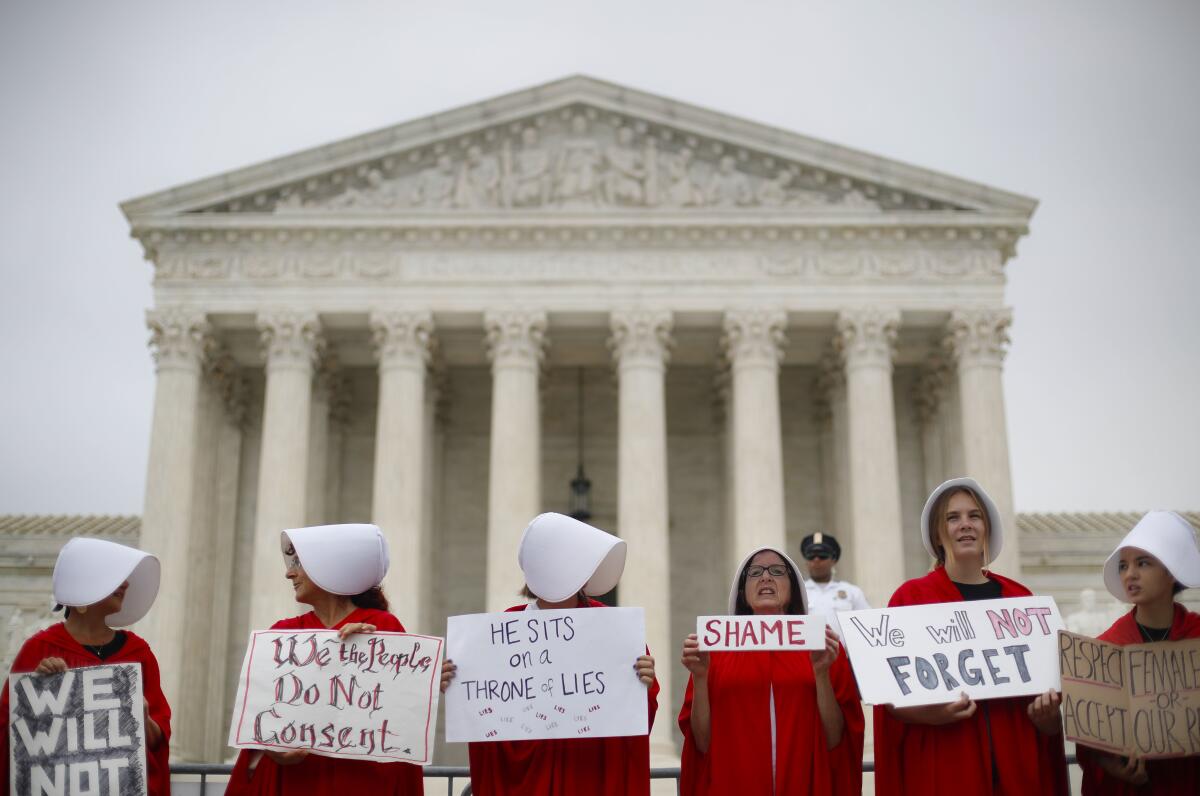How the Texas abortion law could spawn threats to other constitutional rights

- Share via
The threat posed by the Supreme Court’s refusal to block the Texas abortion law — which bans 85% to 90% of abortions performed in the state — goes far beyond reproductive rights. It opens the door to insidious copycat laws that could be used to attack other constitutional rights.
The Texas law bans abortions once a fetal heartbeat can be detected, around six weeks of pregnancy. Instead of requiring state prosecutors to enforce this clearly unconstitutional law, it gives private citizens the right to sue anyone who performs, aids or abets an abortion, or intends to do so, for a $10,000 payment from that party.
Because this law relies only on private civil lawsuits, a person targeted by this law (a clinic, a doctor, a person giving advice, a friend driving a woman to a clinic) cannot take the state or state officials to court to strike down the law. The state of Texas cannot be sued in federal or state court because it has sovereign immunity and it maintains that its officials cannot be sued because they are not involved in enforcing the law.
The bizarre twist in this devious law is that a doctor or other persons targeted can only challenge the law’s constitutionality as a defendant in a civil lawsuit. In other words, a courageous doctor or health professional would have to violate the six-week ban, be sued for money damages in Texas state court, and then argue as a defense that the law is unconstitutional. If a state judge rules in the defendant’s favor and strikes down the law, the case could then go up to the U.S. Supreme Court.
There is a huge risk in this strategy for doctors and health professionals. If the Supreme Court overrules Roe vs. Wade — and its ruling Wednesday night suggests that five justices are willing to do so — then the Texas law would be upheld and the doctors would be liable to pay the money judgments. Not surprisingly, most reproductive healthcare facilities in Texas are complying with the unconstitutional law rather than face a wave of costly lawsuits.
This strategy has provided a road map for other states, not just to undermine abortion rights, but to endanger other constitutional rights as well.
For instance, even though the Supreme Court has ruled that gay and lesbian couples have the constitutionally protected right to marry, a state following the Texas blueprint could outlaw same-sex marriage and then allow private citizens to sue anyone who performs a same-sex wedding for money damages. A state could ban handguns (even though the Supreme Court has ruled that the 2nd Amendment protects a right to possess and own them) and authorize citizens to bring civil suits against anyone who has a handgun. In fact, a state could adopt a law banning criticism of the governor and then allow any private person to sue the critic for money.
Under the Supreme Court’s reasoning in the Texas case, the only way to challenge these unconstitutional laws would be to violate them, get sued by a private citizen, and then fight the lawsuit and the statute’s constitutionality.
This is a preposterous situation. And yet, this is what five conservative justices allowed in the Texas case.
Chief Justice John G. Roberts Jr., joining the three liberals on the court in dissent, wrote that he would have blocked the law. “The statutory scheme before the court is not only unusual, but unprecedented,” he wrote. “The legislature has imposed a prohibition on abortions after roughly six weeks, and then essentially delegated enforcement of that prohibition to the populace at large. The desired consequence appears to be to insulate the state from responsibility for implementing and enforcing the regulatory regime.”
The foundational principle of American jurisprudence is that all laws, criminal and civil alike, must comply with the Constitution. State statutes that prohibit abortion after the sixth week of pregnancy or outlaw same-sex marriage or forbid criticizing the governor all blatantly violate the Constitution. The kind of enforcement mechanism used does not lessen their unconstitutionality.
As Justice Sonia Sotomayor said in her dissent: “It cannot be the case that a State can evade federal judicial scrutiny by outsourcing the enforcement of unconstitutional laws to its citizenry.” If nothing else, the governor of a state, who is responsible for upholding its laws, should be able to be used by citizens trying to stop an unconstitutional law.
Regardless of Texas’ legal ploy, Roe vs. Wade, which held that the Constitution protects a woman’s right to abortion, remains the law of the land — including in Texas. The Supreme Court’s conservative majority, in its zeal to end abortion rights, has now put all constitutionally protected rights in jeopardy.
Erwin Chemerinsky is dean of the UC Berkeley School of Law and a contributing writer to Opinion. He is the author, most recently, of “Presumed Guilty: How the Supreme Court Empowered the Police and Subverted Civil Rights.”
More to Read
A cure for the common opinion
Get thought-provoking perspectives with our weekly newsletter.
You may occasionally receive promotional content from the Los Angeles Times.






